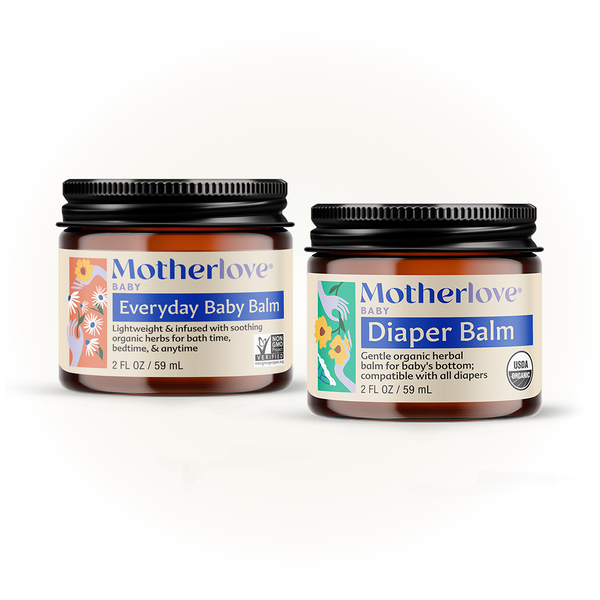Written by: Wendy, IBCLC
Each time your baby hits a new milestone, it’s natural for you to feel a bit anxious and to have lots of questions. Introducing solid foods to your baby is no exception. You might be getting different messages about when the right time is to introduce solids, how to go about it, and what that first food should be. You might also have questions about how often you need to feed solids and what to do if your baby doesn’t seem interested.
The truth is, while there is some basic info that you should know, introducing solids isn’t something you should overthink too much (not always easy, I know!). Solid foods, especially in the first year of your baby’s life, are about exploration, learning, and enjoyment.
HOW TO KNOW IF YOUR BABY IS READY FOR SOLIDS
The Academy Of American Pediatrics (AAP) recommends that babies start eating solids around the middle of their first year of life. They suggest that babies be exclusively breastfed for the first six months and that solids be introduced sometime after that. They recommend that breastfeeding should continue for at least the first 12 months of life and be the primary source of nutrition during that time.
Many parents stress about the exact date that their baby should start solids, but it’s best not to focus so much on the calendar as on your child’s interest and signs of readiness.
Signs that your baby may be ready to start solids may include:
- Can sit up unassisted
- Is beginning to be able to pick up small objects between their thumb and pointer finger (pincer grasp)
- Doesn’t thrust their tongue forward or gag when solids are introduced
- Is about six months old and shows interest in food
If your child isn’t ready at six months, don’t push it. Chances are, they will likely be ready just a few months down the road. As long as your baby is healthy, there is no issue. You don’t want to stress your child out by coercing them to eat when they are not ready.
WHAT FOODS TO OFFER BABY
In the beginning, it’s best to offer one new food at a time and then wait a few days to make sure your baby isn’t having an allergic reaction to the food. Nowadays, most pediatricians do not recommend holding off on common allergens, such as eggs, soy, or dairy products. However, if you have a history of allergies or any other concerns, you should discuss the best way to introduce allergens with your pediatrician.
In general, you want to offer soft, easy-to-digest foods. Stay away from choking hazards such as hot dogs, uncut grapes, hard meat sticks, nuts, and popcorn. Some favorite first foods include avocado, bananas, and oatmeal.
BABY LED FEEDING OR SPOON FEEDING?
You might be unsure whether you should spoon-feed your baby or let them do a more “baby-led” approach to eating solids. It doesn’t really matter—you should see what works best for you or your baby. However, you should be mindful about not forcing your child to eat when they are not interested or making them finish a food when they show signs that they are full.
So, while spoon-feeding, give your baby lots of breaks, and never feel compelled to have them finish a jar of food when they have clearly had enough. If you want your baby to “self-feed,” you can offer them small chunks of foods such as steamed (and cooled) sweet potato or broccoli, pasta, or scrambled eggs.
If you are letting your baby feed themselves, be prepared for a big mess!! Actually, however you feed your baby, solid foods are super messy at first. Get a good, easy-to-clean bib and consider a washable mat under your baby’s high chair for simple clean-up.
WHAT ABOUT WATER FOR BABY?
Before your baby starts solids, there is no reason to give them extra water. Your breast milk has all the fluid requirements that your baby needs, even in warm weather. Once your baby is eating solids, you can offer them sips of water while they eat. But this isn’t a necessity as long as they are still nursing frequently.
HOW TO CONTINUE YOUR BREASTFEEDING JOURNEY
Remember, for the first 12 months of life, or so, breast milk should still be your baby’s primary source of nutrition. Solids are something that should be phased in gradually and according to your baby’s cues. Your baby doesn’t need to eat a certain number of solid meals in a day or a certain number of ounces of food. Find a routine that works for you and your baby.
To keep breast milk as the primary food source, continue to nurse your baby on demand. At first, you can nurse your baby before they eat solids, so they don’t fill up solely on solids and skip nursing sessions. Continue to make nursing a source of comfort and nutrition—this will ensure that the breastfeeding relationship is strong even as solids are introduced.
Most of all, have fun. Introducing solids to your baby should be all about pleasure, exploration...and yes, messiness. But isn’t that what childhood is all about?





